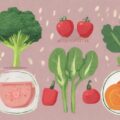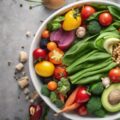Why Zinc is Essential for Your Health and Wellbeing
Zinc is a vital mineral that plays a crucial role in supporting our overall health and wellbeing. This unsung hero of nutrition is involved in numerous bodily functions, from boosting our immune system to promoting healthy growth and development. By understanding the importance of zinc and incorporating zinc-rich foods into our diet, we can nourish our bodies and cultivate a sense of vitality and balance.
In this compassionate guide, we’ll explore the best sources of zinc in your diet, highlighting nutrient-dense foods that not only provide this essential mineral but also contribute to a well-rounded, wholesome eating plan. Let’s embark on this journey of nutritional discovery together, with a focus on nurturing our bodies and minds through mindful food choices.
Zinc-Rich Foods from the Plant Kingdom
Nature has blessed us with an abundance of plant-based foods that are excellent sources of zinc. By incorporating these foods into our diet, we not only nourish our bodies but also show kindness to the planet and its inhabitants. Here are some zinc-rich plant foods to consider:
- Pumpkin seeds: These little powerhouses are packed with zinc and other nutrients. Sprinkle them on salads or enjoy as a snack.
- Chickpeas: Versatile and delicious, chickpeas can be used in various dishes, from hummus to curries.
- Lentils: These protein-rich legumes are also a good source of zinc. Try them in soups, stews, or salads.
- Cashews: A handful of cashews can provide a significant amount of zinc. Enjoy them as a snack or use in plant-based cheese alternatives.
- Oats: Start your day with a bowl of zinc-rich oatmeal for sustained energy and nutrition.
By incorporating these plant-based zinc sources into our meals, we can nourish our bodies while also embracing a more sustainable and compassionate approach to eating.
Animal-Based Sources of Zinc
For those who include animal products in their diet, there are several excellent sources of zinc to consider. When choosing animal-based foods, it’s important to prioritize ethically sourced options that support both our health and animal welfare. Here are some zinc-rich animal foods:
- Oysters: These sea creatures are one of the richest sources of zinc available. Enjoy them occasionally as a special treat.
- Grass-fed beef: Choose lean cuts from ethically raised cattle for a good source of zinc and other nutrients.
- Free-range chicken: Opt for chicken raised in humane conditions for a healthy source of zinc and protein.
- Wild-caught salmon: This fish is not only rich in zinc but also provides heart-healthy omega-3 fatty acids.
- Organic eggs: Eggs from free-range hens are a versatile source of zinc and other essential nutrients.
When incorporating animal-based zinc sources, it’s essential to practice moderation and choose options that align with our values of compassion and sustainability.
Combining Foods for Optimal Zinc Absorption
To make the most of the zinc-rich foods in our diet, it’s helpful to understand how to optimize zinc absorption. By mindfully combining certain foods, we can enhance our body’s ability to utilize this essential mineral. Here are some tips for maximizing zinc absorption:
- Pair zinc-rich foods with vitamin C sources, such as citrus fruits or bell peppers, to enhance absorption.
- Include fermented foods like yogurt or kefir in your meals, as the fermentation process can increase zinc bioavailability.
- Soak or sprout legumes and grains before cooking to reduce compounds that can inhibit zinc absorption.
- Enjoy zinc-rich foods with healthy fats, as zinc is fat-soluble and better absorbed when consumed with some fat.
By thoughtfully combining foods, we can create nourishing meals that not only taste delicious but also support our body’s ability to absorb and utilize zinc effectively.
Mindful Supplementation: When and How
While it’s always best to obtain nutrients from whole foods, there may be times when zinc supplementation is necessary. It’s important to approach supplementation with mindfulness and under the guidance of a healthcare professional. Here are some situations where zinc supplements might be considered:
- During pregnancy or breastfeeding, when zinc requirements are higher
- For individuals with certain health conditions that affect zinc absorption
- For vegetarians or vegans who may have limited zinc intake from plant sources
- For older adults who may have difficulty absorbing zinc from food
If you’re considering zinc supplementation, it’s crucial to consult with a healthcare provider to determine the appropriate dosage and form of zinc for your individual needs. Remember, balance is key, and excessive zinc intake can interfere with the absorption of other important minerals.
Embracing a Zinc-Rich Lifestyle for Holistic Wellbeing
Incorporating zinc-rich foods into our diet is just one aspect of a holistic approach to health and wellbeing. By embracing a lifestyle that prioritizes nourishing foods, mindful eating practices, and self-care, we can support our body’s natural balance and vitality. Here are some additional tips for cultivating overall wellbeing:
- Practice mindful eating by savoring each bite and paying attention to hunger and fullness cues
- Engage in regular physical activity that you enjoy, such as walking in nature or gentle yoga
- Prioritize quality sleep to support your body’s natural healing and rejuvenation processes
- Manage stress through meditation, deep breathing, or other relaxation techniques
- Nurture social connections and cultivate meaningful relationships
By approaching our nutrition and lifestyle choices with compassion and mindfulness, we can create a foundation for lasting health and wellbeing that nourishes both body and soul.
Frequently Asked Questions
1. How much zinc do I need daily?
The recommended daily intake of zinc varies depending on age, gender, and life stage. Generally, adult men need about 11 mg per day, while adult women need about 8 mg. Pregnant and breastfeeding women may require more. It’s best to consult with a healthcare professional for personalized recommendations.
2. Can I get enough zinc from a vegetarian or vegan diet?
Yes, it’s possible to obtain sufficient zinc from a plant-based diet. However, it may require more careful planning as zinc from plant sources is less bioavailable. Focus on including zinc-rich plant foods like legumes, whole grains, nuts, and seeds in your diet. Consider consulting a registered dietitian for guidance on meeting your zinc needs through a vegetarian or vegan diet.
3. Are there any signs of zinc deficiency?
Some signs of zinc deficiency may include weakened immune function, slow wound healing, loss of appetite, hair loss, and changes in taste or smell. However, these symptoms can be associated with other conditions as well. If you suspect a zinc deficiency, it’s important to consult with a healthcare provider for proper diagnosis and treatment.
4. Can too much zinc be harmful?
Yes, excessive zinc intake can be harmful. It can cause nausea, vomiting, loss of appetite, abdominal cramps, and headaches. Long-term excessive intake can interfere with copper absorption and affect immune function. It’s important to stay within the recommended daily intake and avoid excessive supplementation unless directed by a healthcare professional.
5. How can I increase zinc absorption from my food?
To enhance zinc absorption, try pairing zinc-rich foods with vitamin C sources, include fermented foods in your diet, soak or sprout legumes and grains before cooking, and consume zinc-rich foods with some healthy fats. Additionally, be mindful of substances that can inhibit zinc absorption, such as phytates found in some grains and legumes, and moderate your intake of these foods if necessary.









